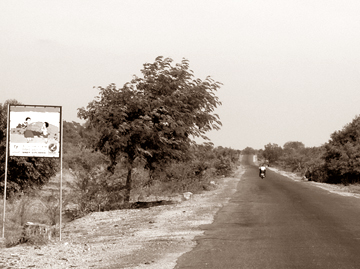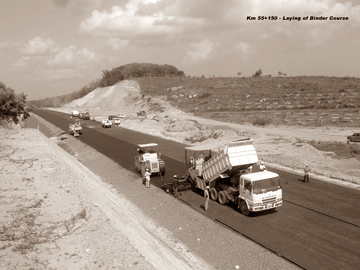Roads to prosperity

|

A-9 Road |
Roads are vital for any nation, developing or developed. They are
virtually the lifeline of a country, moving goods and people from place
to place. Indeed, it would be hard to imagine a modern economy without
roads. Smooth, well paved roads help people travel faster, saving time
and money. This is vital for development. It is also necessary to widen
many roads to cope with the ever-increasing vehicle population.
In Sri Lanka, there was a common complaint that there would have been
no roads in the country if not for the British. There was some truth in
this generalisation, but not any longer. The Government has embarked on
a massive, unprecedented road and bridge development drive all over the
country. Among them are the Kandy-Colombo, Colombo-Matara, Outer Colombo
Circular and Katunayake expressways and numerous bridges and flyovers
over busy intersections.
There is no doubt that these initiatives will drastically reduce
travel times across the board. If it takes four hours to reach Matara
now, the expressway will enable motorists to reach that goal in two
hours or less, hopefully at speeds of up to 120 Km/h. This is a great
stimulant for the economy. The Government should identify more cities
for linkage via expressways.
They are initially hugely expensive to build but the benefits are far
greater. Another plus point is that a reasonable toll can be levied from
road users to recover at least part of the investment and for regular
maintenance.
In the meantime, the maintenance and re-development of existing
roadways should be given priority. Sri Lanka has thousands of kilometres
of A, B and C class roads. While A-Grade roads comprise the major trunk
roads (A2 - Colombo-Galle/A4 - Colombo-Batticaloa and A9-Kandy-Jaffna
are the main examples), B and C roads are often inter-provincial and
rural roads. Another confusing factor is that some of the latter roads
belong to the Provincial Councils and local bodies, which may not always
have the funds required for upgrading such roads.
Nevertheless, it is vital to upgrade these roads in line with modern
trends. The Government has built many all-new concrete roads while
applying concrete on existing tarred roads. This is a very good approach
which will give a longer lifespan to these roads. Normal carpeting is
also being done. The authorities should turn their attention to rural
roads.
|

Southerhn expressway under construction |
There still are many remote villages where the residents have to walk
through shrubbery or jungle for several kilometres to reach the nearest
main road. This is not an acceptable situation. There are other villages
where the access road is so dilapidated that vehicular movement is
nearly impossible. This leads to a vicious cycle where bus and transport
operators refuse to ply on these routes, compounding the problems of the
village community. It is thus vital to turn the authorities' attention
to these roads. There should be close coordination between the Central
Government and Provincial Councils in the maintenance of rural roads run
by the latter. The Government's road budget should take all these
concerns into account.
There are many other issues apart from repairing roads. Many roads in
the country, even some of the major ones, do not have street lights.
This is a hazard for both pedestrians and motorists who use these roads
at night. This is mostly the responsibility of local bodies, but the
Central Government should intervene where the local body in question may
not be able to carry out the task.
Many roads also do not have clear lane demarcations and Cat's Eyes
for easy lane identification at night. Road signage is another important
factor. It is important to keep the road signs up to date and also give
proper directions and distances to motorists.
These signs should be clearly visible in darkness. Unfortunately, not
many motorists know the meaning of most road signs and even fewer care
for them, but that is no excuse not to have them. It is therefore
essential to educate motorists on these signs. Distance indicators and
pointers should also dot the roads at regular intervals.
Signal lights are also essential to help the traffic flow.
However, only Colombo, its suburbs and a few other provincial cities
have traffic lights. There still are many major intersections, cities
and towns which do not have traffic lights. This leads to congestion
especially at peak hours. Traffic lights are now being manufactured
locally and are not so expensive as they once were. There is no longer
any excuse not to have them at more places. This will also take a load
off the police.
Another annoying issue is the digging of roads frequently for water
supply, electrical cable, sewerage and telecom repairs. Clearly, there
is no coordination among these utility providers. When a road is
repaired after one party digs it up, another one comes to do the same
thing again. A little effort at coordinating these repairs will be less
costly and less inconvenient to road users.
Sometimes a tussle develops over who is exactly responsible for
repairing a road which has been dug up. A mechanism should be evolved to
coordinate roadworks and excavations and in general, the utility company
that had dug up the road should provide funds for covering it as well.
Some local bodies also effect 'patch-up' jobs in place of
comprehensive repairs. This does not pay in the end as the road gets
damaged again in a short period. Then it usually costs more to repair.
Many people cite a nexus between contractors and local bodies for this
state of affairs. It is far more effective to undertake a more thorough
repair that can withstand several years of use.
All major roads should also have sidewalks, drains and an emergency
lane. One major problem in most towns is that traders have invaded the
pavements, compelling pedestrians to use the road per se. This makes
them sitting ducks for reckless drivers.
Action should be taken on this issue. With the Uthuru Wasanthaya and
Negenahira Navodaya under way in the North and the East, rebuilding the
roads in these two provinces has become a priority. Better roads will
make a difference to the lives of the residents there, including the
newly resettled.
The A9 road has already spurred the Northern economy and a better
North-East road network would be a major boost. Colombo and Kandy should
be only a few hours away from the major towns of the North and the East.
The need has arisen for a national road policy which takes into
account all these considerations and many other factors. Better roads
are our path to a bigger economy and a more prosperous future. |

